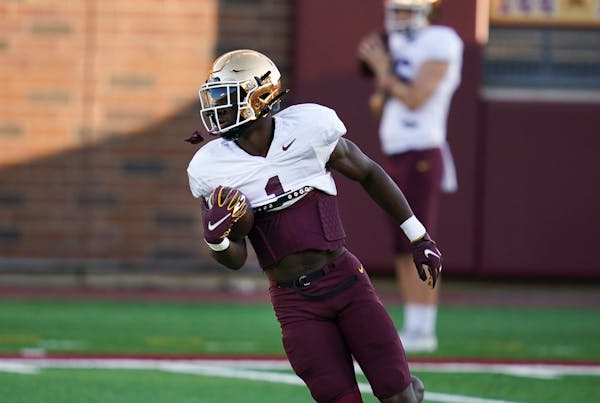Through the season's first five games, the Gophers football team relied heavily on the run game, rushing the ball 71.7% of the time vs. passing on 28.3% of its plays.
The approach resulted in a 3-2 record but yielded a passing attack that ranked 124th of 130 FBS teams and last in the Big Ten at 141.8 yards per game.
The bye week offered coach P.J. Fleck and offensive coordinator Mike Sanford Jr. a chance for review and reflection. On Saturday against Nebraska, the Gophers embraced the forward pass — at least for most of three quarters — and the result was a 30-23 victory over the Cornhuskers that pushed Minnesota's record to 4-2 overall and 2-1 in the Big Ten.
"Good balance back and forth,'' Fleck said Monday during his weekly news conference, "and when your players are making plays, that's when offenses are pretty efficient.''
Sanford loosened the reins with Tanner Morgan, and the quarterback immediately took advantage of the return to health of wide receiver Chris Autman-Bell. The two connected five times for 41 yards in the first quarter as the Gophers took a 7-3 lead by gaining 72 yards on 10 passes and balancing that with a run game that had 10 carries for 35 yards.
That passing success took off in the second quarter, when Morgan first found receiver Mike Brown-Stephens for a 28-yard touchdown play for a 14-3 lead, then lofted a pass that Autman-Bell amazingly high-pointed over a Cornhuskers defensive back and caught for a 7-yard TD in the corner of the end zone for a 21-9 lead.
"Up front, we protected really well, especially in the play-action game, giving Tanner some time to be able to throw the ball down the field,'' Fleck said. "I thought we made plays, contested catches. … We got Tanner into a rhythm really early.''
Indeed, as Morgan completed 14 of his 15 first-half passes. He was 6-for-6 for 104 yards and the two TDs in the second quarter. The Gophers' run-pass balance continued, with 10 second-quarter carries for 42 yards before two kneel-downs at the end of the second quarter produced minus-6 yards. If you throw out those two, Minnesota had 20 rushes to 16 passes, a 55%-45% split.
"It took everybody on offense to be able to have success in the first half,'' Fleck said. The stat sheet supported that, with wildcat formation QB Cole Kramer contributing a fourth-down TD pass to tight end Brevyn Spann-Ford and true freshman wideout Brady Boyd hauling in the first reception of his career.
Fleck and Sanford stayed aggressive with the passing game to start the second half, with Morgan on three consecutive plays hitting Spann-Ford for gains of 19 and 1 yards and Dylan Wright for 17 to the Nebraska 37-yard line. That gave the QB a school-record 16 consecutive completions. However, on Morgan's second-down pass from the 33, Nebraska All-Big Ten cornerback Cam Taylor-Britt made a strong play for an interception in the end zone.
When Morgan's next pass was intercepted on the following Gophers possession and the Huskers cashed it in for a touchdown that cut the lead to 21-16, Minnesota's offensive approach changed. Morgan would throw only four more passes, and just one in the fourth quarter, completing three for 3 yards. Fleck turned the game over to the defense and the running game to lock down a victory.
"It became a little bit more of a chess match in the second half, and we weren't as good on first and second down in the second half, which created those third-and-3s and third-and-2s,'' he said.
The strategy worked, with the defense getting a goal-line stand, another fourth-down stop and a safety. The Gophers run game clinched it on Bryce Williams' 56-yard TD run with 2:12 to play and his two carries for 12 yards and a first down following Boyd's onside kick recovery.
For the game, the Gophers rushed the ball 63.2% of the time while passing it on 36.8% of their plays, and that's the most balanced they've been this season. They produced 214 yards and three TDs through the air and 182 yards and one TD on the ground.
"When the opportunity knocked, they answered,'' Fleck said of his players. "We just have to be more consistent as the year goes on.''




